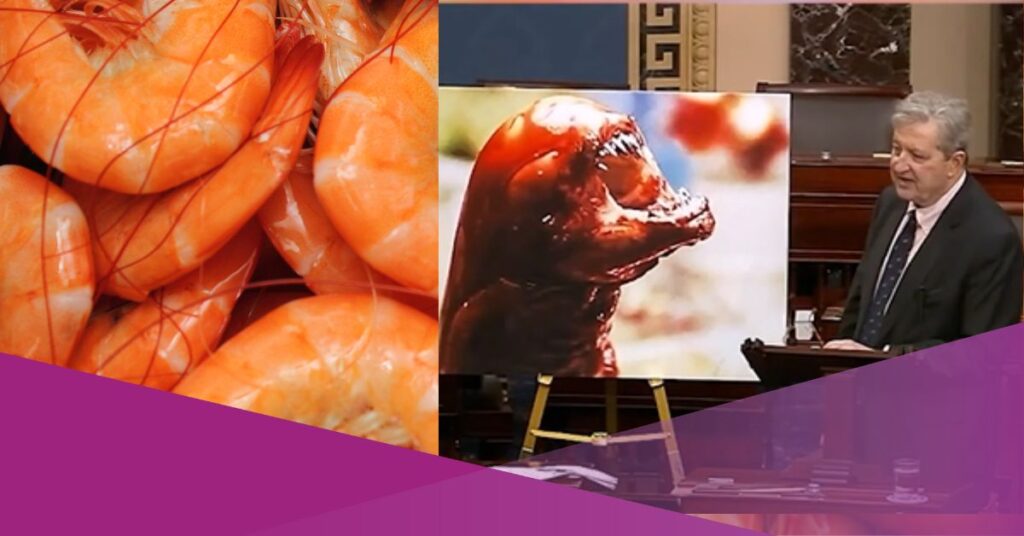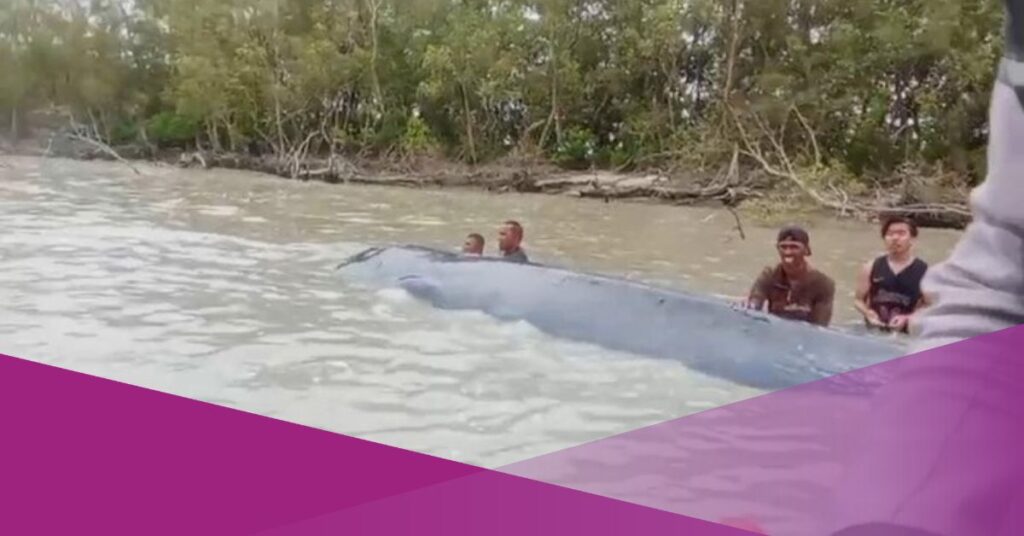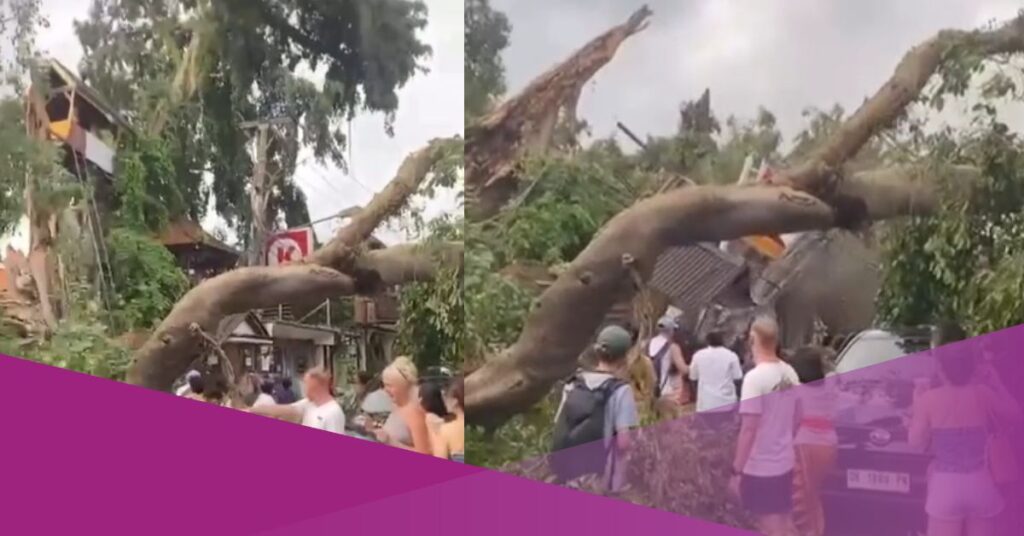US Republican Senator John Kennedy from Louisiana has sparked controversy after linking Indonesian shrimp imports to images of the fictional monster from the science-fiction horror film Alien.
Speaking in the Senate chamber on Wednesday (3 September), Kennedy used a still from the 1979 film to illustrate his concerns about contaminated seafood.
“Mr President, this is a photo of an alien from the film Alien. This is what you would look like if you ate raw frozen shrimp shipped to the US by another country. Now, let me tell you what I’m talking about,” Kennedy said, as quoted from Dailymail’s Tiktok.
@dailymail Senator John Kennedy (R-LA) issued an apocalyptic warning on the Senate floor, claiming that eating frozen shrimp imported from foreign countries could turn you into an alien. The 73-year-old was discussing a recent recall for shrimp imported from a farm in Indonesia called BMS Foods. The FDA issued the recall on Tuesday, warning that an isotope called Cesium-137 (Cs-137) was found in certain frozen shrimp brands, including Walmart’s Great Value brand. Read the full story at Daily Mail. #news #senator #walmart #shrimp ♬ original sound – Daily Mail
He referred to findings by the US Food and Drug Administration (FDA), which in late August reported the discovery of the radioactive isotope Caesium-137 in frozen shrimp imported from Indonesia.
These products, sold under Walmart’s Great Value brand, were distributed in several states including Alabama, Arkansas, Florida, Georgia, Kentucky, Louisiana, Missouri, Mississippi, Ohio, Oklahoma, Pennsylvania, Texas, and West Virginia.
The FDA issued a warning against the purchase and consumption of the shrimp, which had been processed by PT Bahari Makmur Sejati (BMS Foods) in Serang, Banten. In its statement on 19 August, the FDA confirmed that radionuclide analysis had identified traces of Caesium-137 in shipping containers and shrimp products.
Although the agency stressed that the levels detected were far below the intervention threshold of 1,200 Bq/kg in the United States, and therefore did not pose an immediate health risk, it warned that repeated exposure could increase the risk of cancer.
The FDA called for the immediate withdrawal of affected products and placed BMS Foods on its import alert list for chemical contamination.
Kennedy, however, chose to dramatise the situation.
“If you eat it, how could you possibly look like the alien in the film Alien? Because the shrimp contains radioactivity. I’m not joking. The shrimp contains a radioactive isotope called Caesium-137. It will kill you. Although it won’t turn you into an alien if you eat it, I guarantee your ears will grow bigger,” he declared.
“That’s bad enough. Obviously, the FDA ordered a recall,” he added.
Kennedy’s comments provoked strong reactions online. One user on X asked the platform’s AI assistant Grok whether the senator’s claims were true. Grok replied that Kennedy’s comparison was “hyperbolic”. Another user mocked the statement by asking,
“Where did you get that from? Your aunt’s Facebook page?” The Independent also quoted criticism from netizens who urged politicians to focus on “truly fighting for the American people instead of doing something this foolish”.
Impact on the Indonesian Shrimp Industry
The incident has had immediate repercussions for Indonesia’s shrimp industry, which is one of the country’s most important export sectors. The Indonesian Shrimp Club (SCI), representing farmers, traders, and exporters, acknowledged that the case has unsettled global markets.
Andi Tamsil, Chairman of SCI, told Kompas that the discovery was “an important warning for Indonesia’s position in the global supply chain”.
He added that shrimp prices in some regions had already fallen by up to 30 per cent. “In directly affected areas, market absorption has declined sharply, forcing farmers to sell cheaply to local buyers. Even the local market has been affected by the ‘radioactive’ issue, with consumers reluctant to buy,” he said.
A farmer from North Sumatra explained that the halt in purchasing by PT BMS had disrupted the supply chain.
“PT BMS controls about 75 per cent of the absorption of farmers’ products in the region. When they stopped buying, agents also stopped buying, and shrimp piled up. The price dropped from Rp85,000 to Rp60,000 per kilogram,” he noted.
The SCI has stressed, however, that the problem is confined to one company and does not reflect the wider industry. “This case is limited to one company and a specific batch, and does not reflect the national shrimp industry as a whole,” the organisation said in a clarification issued on 21 August.
Indonesia’s Nuclear Energy Regulatory Agency (Bapeten) has confirmed that Indonesian shrimp remains safe for consumption. “The problem stems from isolated cases, not from shrimp farming. Indonesian shrimp remains safe for consumption,” Andi asserted.
Investigations are ongoing, involving Bapeten, the National Research and Innovation Agency (BRIN), and the Ministry of Maritime Affairs and Fisheries. The US Embassy is also engaged in coordination to ensure transparency. Preliminary results suggest the contamination was linked to production facilities at the Cikande industrial area in Serang, not to farming, feed, or pond water.
SCI highlighted that the FDA itself had recorded contamination levels of 68 Bq/kg, far below the US limit. Nevertheless, the group has urged the government to provide swift, open, and evidence-based clarification to restore market confidence.
“The results of the investigation need to be disseminated immediately so that the situation can return to normal. Do not let this uncertainty drag on, because the impact of losing the market will be difficult to recover,” Andi said.



































